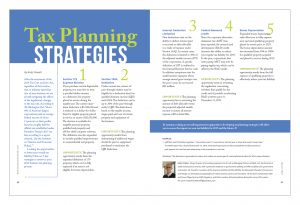Tax Planning Strategies
After the enactment of the 2018 Tax Cuts and Jobs Act, regardless of the location, size, or industry specialization of your business, we are all still navigating the effects of the legislation’s changes to the tax code. According to The Washington Post, “about 400 of America’s largest corporations paid an average federal tax rate of about 11 percent on their profits last year, roughly half the official rate established under President Trump’s 2017 tax law, according to a report released…[by the Institute on Taxation and Economic Policy].”1
Looking for opportunities to lower your overall tax liability? Here are 5 key strategies to review in your 2019 business tax planning process.
Section 179 Expense Election
If you purchase certain depreciable property, you may elect to treat a specified dollar amount as a deduction for property placed in service during the taxable year. The current maximum deduction is $1,020,000 and is reduced on a dollar-for-dollar basis for eligible property placed in service in excess of $2,550,000. The election is available for
tangible personal property, qualified real property, and off-the-shelf computer software. The definition was also expanded to include qualified improvements to nonresidential real property.
Opportunity: The planning opportunity results from the expanded definition of 179 property, which can be fully expensed if an asset is not eligible for bonus depreciation.
Section 199A Deduction
Under current law, owners of pass-through entities may be eligible for a deduction based on qualified business income (QBI) until 2026. The deduction can be up to 20% of the pass-through entity’s QBI. The deduction is based on the taxable income, wages paid, and cost of certain property and equipment of the business.
Opportunity: The planning opportunity results from determining if additional wages should be paid or equipment purchased to maximize the QBI deduction.
Interest Deduction Limitation
New limitations exist on the ability to deduct interest paid or accrued on debt allocable to a trade or business under Section 163(j). In certain cases, the deduction is limited to 30% of the adjusted taxable income (ATI) of the corporation. A specific definition of ATI is outlined in the Internal Revenue Service code. In addition, exceptions exist for small business taxpayers whose average annual gross receipts over the past 3 years do not exceed $25 million.
Opportunity: The planning opportunity lies in reviewing the amount of debt allocable versus the projected adjusted taxable income to ensure all interest expense will be deductible.
Federal Research Credit
Since the corporate alternative minimum tax (AMT) has been repealed, the research and development (R&D) credit increases the ability to reduce your regular tax liability for 2019. In the past, corporations that were paying AMT may now be paying regular tax, which can be offset by the R&D credit.
Opportunity: The planning opportunity exists in reviewing the regulations concerning
activities that qualify for the credit and, if possible, accelerating R&D activities prior to December 31, 2021.
Bonus Depreciation
Expanded bonus depreciation rules allow you to fully expense new and used qualifying property placed in service prior to 2023. The bonus depreciation amount was increased from 50% to 100% for qualified property acquired and placed in service during 2019.
Opportunity: The planning opportunity results from the full expense of qualifying property to effectively reduce your tax liability.
In summary, taking an overall organization approach to developing tax planning strategies will allow you to assess the impact on your tax liability for 2019 and the future.
Sources:
1. Jeff Stein and Christopher Ingraham, “Corporations paid 11.3 percent tax rate last year, in steep drop under Trump’s law,” The Washington Post, Accessed December 16, 2019, www.washingtonpost.com/business/2019/12/16/corporations-
paid-percent-tax-rate-last-year-steep-drop-under-president-trumps-law.
Disclaimer: This discussion is generalized in nature and readers are encouraged to seek professional advice for their unique situation.

